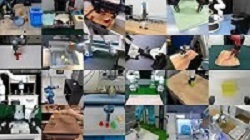In the realm of robotics, one of the ultimate goals is to create machines that can learn and adapt. However, in an era where the term “general purpose” is thrown around casually, it can be challenging for those outside the field to understand the capabilities of current robotic systems. The truth is that most robots today are designed to excel at one specific task, or at best, a few tasks.
This reality is true across the industry, whether it be a simple robot vacuum or a highly advanced industrial system. So, how do we transition from single-purpose robots to general-purpose robots? The answer lies in robot learning. Nowadays, robotics research labs around the world are dedicated to tackling this very challenge. Startups and corporations, such as Viam and Intrinsic, are also focused on lowering the barriers to robot programming.
There is currently a wide range of solutions being explored, but it is evident that there won’t be a single silver bullet to solve this problem. Instead, building more complex and capable systems will require a combination of solutions. A crucial component for most of these solutions is the availability of a large, shared dataset.
This week, Google’s DeepMind robotics team announced its collaboration with 33 research institutes to create a massive shared database called Open X-Embodiment. The researchers compare this database to ImageNet, a collection of over 14 million images that has been instrumental in advancing computer vision research since 2009.
According to DeepMind researchers, Quan Vuong and Pannag Sanketi, just as ImageNet revolutionized computer vision research, Open X-Embodiment has the potential to do the same for robotics. The first step towards training a generalist model that can control various types of robots, understand diverse instructions, perform basic reasoning, and generalize effectively is to build a dataset of diverse robot demonstrations.
The Open X-Embodiment database includes over 500 skills and 150,000 tasks performed by 22 different types of robots. As the name suggests, the data will be made available to the entire research community.
The DeepMind team hopes that by open-sourcing the data and providing limited models, they can lower barriers and expedite research in this field. They believe that the future of robotics lies in enabling robots to learn from each other and, more importantly, allowing researchers to learn from one another.




